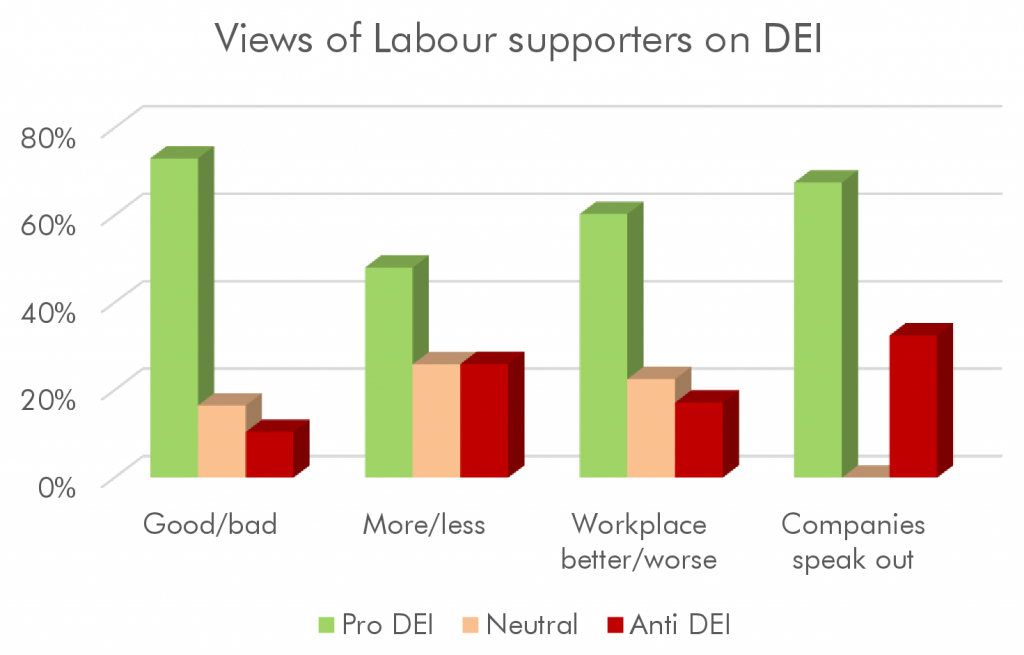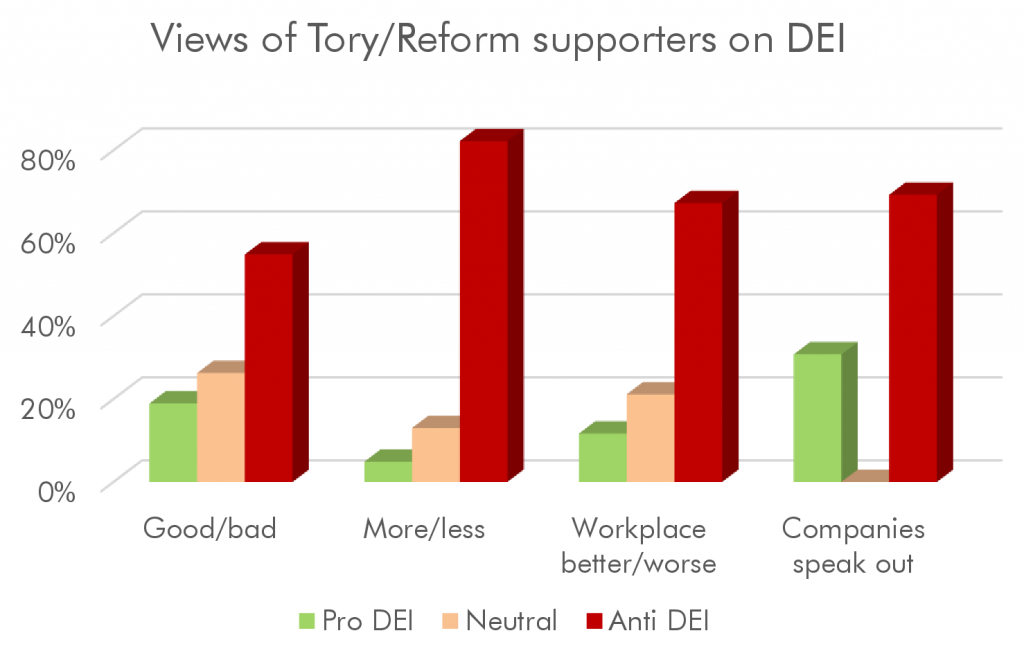Suppose you suggested to a company manager that they adopted an initiative which was guaranteed to split their workforce and customer base politically. Half of people would love it, and the other half would hate it.
A manager would normally be expected to pass up an opportunity to annoy half of their staff and customers.
But not if the initiative is called diversity, equality and inclusion (DEI). Companies have been adopting it up and down the country. It sounds well-meaning, but perhaps not everyone realises how controversial it is.
Our exclusive new poll for the Property Chronicle shows that DEI initiatives are splitting the nation down the middle on partisan grounds. People who support the Labour party mostly love DEI and can’t get enough of it. But to supporters of the Conservatives and Reform UK, it’s toxic and they dislike it intensely.
DEI has its roots in US academia from where concepts like “safe spaces” and “micro aggressions” have joined with anti-racism and transgenderism to enter the corporate world.
A typical DEI curriculum focuses on promoting diversity as a good, reducing bullying and bias, promoting inclusivity, and making employees aware of their obligations under the law.
Many managers have authorised DEI staff training on the basis that this all sounds reasonable enough and might help reduce legal risk.
But critics have questioned whether anti-discrimination policies have any positive effect in practice, and whether the broad goals of DEI are too driven by left-wing concepts of social justice and equality. Critics of affirmative action and compulsory “diversity statements” say that DEI has become a tool of political discrimination.
But what do the British public think?
We asked them a number of questions about DEI to find out. Although DEI is an important subject not everybody has an opinion about it, perhaps because not everyone has come into direct contact with it.
Across our questions, there were a notable number of people who replied, “don’t know”. That fraction ranged from 23% to 30% of all respondents. The figures we give below exclude those who said “don’t know” to measure opinion among those who have an opinion one way or another.
We asked four questions specifically about DEI: whether it is a good or bad use of time; whether it has gone too far or not far enough; whether it has made workplace culture better or worse; and whether companies should take public positions on political or social issues.
The poll results at first sight look unremarkable. Overall, the public think DEI is good by a margin of 48% to 29%, but they think it has gone a bit too far, by 54% to 26%. In terms of workplace culture, there is a balance with 42% thinking it has made things worse, and 36% thinking better. On companies speaking out, there is another close result with 49% thinking companies should speak out and 51% against.
But the poll becomes much more interesting when we look at the so-called “cross tabs”, or the breakdown of the results by sub-groups of the population. In particular, we looked at how respondents answered the questions depending on how they voted at the last general election in July 2024. Then the results were striking.
Let’s start with people who voted Labour last July, which was over one third of the people who voted then.
Among Labour supporters there is very clear and strong support for DEI. An impressive 73% of Labour voters think DEI is a good use of time, 48% think there should be more of it, 60% think it’s made workplaces better, and 68% think companies should speak out on social issues. That’s big majorities in favour of DEI across almost all the questions. Labour voters were a little bit nuanced on the second question, but 74% of them think DEI hasn’t gone too far.
The first bar chart shows these figures graphically. The tall green bars indicate support for DEI among Labour voters, and the “anti-DEI” red bars are much smaller.

But things are very different when we look at people who voted either Conservative or Reform last year.
They were about 40% of the turnout, and they have a different view of DEI.
A majority (55%) think it is a bad use of time; a very large majority (82%) think it has gone too far; 67% think it has made workplaces worse; and 69% think that companies should stay silent or neutral on social and political issues.
The second bar chart shows what this group thinks — these red bars tower above the green ones.

We also asked people which groups they think are discriminated against, and which they think get too much special treatment.
Again, there were big partisan differences. Labour supporters think everyone except white men are discriminated against and no-one gets too much special treatment, except perhaps men (25%). But Conservative and Reform voters see it very differently. They often think white and old people are discriminated against (46% and 41% respectively), and Reform supporters think the working class are disadvantaged (41%). But many Conservatives and Reform supporters think that Muslims (48%) and ethnic minorities (38%) get too much special treatment.
Our poll suggests strongly that DEI is a divisive issue which pleases half the population and displeases the other half. If an employer’s staff and customers are predominantly left leaning, then a strong DEI stance can make perfect business sense. But otherwise, employers and managers should be careful not to create unnecessary political rancour. As Michael Jordan once said: “Republicans buy sneakers too”.
Technical note: Electoral Calculus and Find Out Now interviewed 2,330 GB adults online between 6-9 May 2025. Data were weighted to be demographically representative of all GB adults. Find Out Now and Electoral Calculus are members of the British Polling Council.
This article was originally published in the The Property Chronicle Summer Issue 2025.







